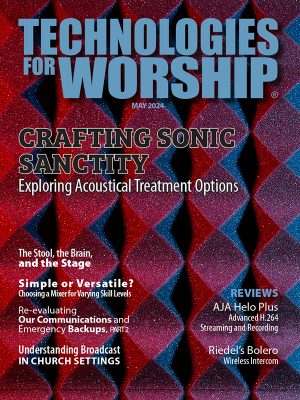
Practically every homeowner knows about sweat equity, not only from the aspect of creating a more valuable property, but because of the work it takes to ensure that increased value. For those of you not familiar with the term, “sweat equity” refers to the owner performing tasks, repairs, and upgrades that increase the value of a property, typically a home, instead of paying for labor. The labor is paid with the homeowner’s toil and sweat, hence the term “sweat equity.”
Let’s look at this notion with respect to the house of worship and our work. The Book of Acts records people miraculously healed or delivered by simply touching the Apostle Paul’s handkerchiefs and aprons. But what was so special about Paul’s garments, that the mere handling of them brought about such amazing results? In a word: sweat.
Yes, as disgusting as that may sound, Paul’s handkerchiefs and aprons were covered in his sweat. Historians and Bible scholars basically agree on what Paul’s pre-incarceration daily life was like. He woke early, immediately went to work as a tentmaker, preached in the afternoons, worked again in the evenings, and wrote letters to the various churches at night. Obviously, with the physically demanding work, combined with the often-scorching heat in the late mornings, early afternoons, and evenings, there was a lot of sweat surrounding his trade. There were no sewing machines, no high-powered cutting devices; just a man and his tools to fabricate tents for whatever purposes his customers needed.
But Paul was no run of the mill tentmaker. In his previous life, he was Saul, a Pharisee of the highest order, but after his Damascus Road conversion, with his knowledge of the Law combined with a newfound passion for Christ, he became the New Testament’s most prolific author. In like fashion with Jesus, the miraculous followed him, both in-person and through the garment-touching. Simply put, Paul’s work created a vehicle for the miraculous, for life change, for others to experience the power of God.
And that’s where you and I come in. Our work in the “house” may be that of a physically challenging nature, or it may be that of the technical or creative arts, but it is our work and sweat that brings value. It is our DNA left on a piece of rigging, a ladder, a lighting or audio console, or a computer mouse or trackpad that helps to bring about the miraculous, the changed lives, the experience of the love, power, and presence of a great God. We don’t deal in tents, aprons, and handkerchiefs but in text overlays, aperture settings, and handheld devices.
It’s easy to forget what our DNA imprinted on the work can create. We can get so bogged down in the message notes and music lyrics, the framings and fades, the mixing and mastering, that we miss the moments and ministry, the friendships and fellowship, the message, and the Messiah. Even from my vantage point, I can lose sight of the fact that it’s my work of resourcing ministry that makes an impact. Clearly, God is all-powerful and can do all the work Himself, but for whatever reason, He chooses us. It is our work that brings value to His house, to His Kingdom, to His Church.
With the realization that our work and sweat are important, we should view mediocrity as the enemy. The “house” deserves our very best. When the temple in Jerusalem was built, there were very strict demands placed on the builders, very specific directions as to the type of materials, dimensions, and colors the workers would use. History is full of cathedrals constructed to display the glory and majesty of God, with painstaking detail and artistry that still goes unchallenged today. In our modern world of the black box lit up by intels and haze, it’s easy to forget that we are still to represent the majesty, wonder, and amazingness that is our God. Anything less than our best is simply not enough.
At this point, you might say, “Well, Richard, I don’t have all of those things. We’re a small church, and the budget doesn’t allow for all of that.” The good news is that excellence doesn’t have budgetary constraints — none whatsoever. Just as a homeowner saves money on labor, we can all increase the value of our “house” by simply paying extra attention to detail, getting input from others who are not only talented but faithful to the local “house.” As for my friends with the seemingly unlimited budget, my answer would be the same. Not every issue needs to be solved by buying gear. We can all start somewhere, believing that our work and our sweat will bring value.
For example, if a chord chart is consistently wrong (and a good many of them are), change it so that it’s now right every time, saving potentially hours of rehearsal time and frustration within the worship team. Periodically refocus your lights, giving you a better presentation for live and recorded or online experiences. If there are processes that need updating, update them. The brief moments of grief and work are well-spent, knowing that the alterations made (tentmaking pun fully intended) will bring an overall increased value to the “house.”
If it were just for the sake of increasing the “house’s” value, that would be one thing, but it’s the experiences created in said house that bring about changed lives. By creating a more valuable space, we remove distractions, we enhance worship, we come alongside the God who chooses to use us to do His will on Earth, we become part of something bigger than ourselves. We bring value to His Church.
Just as it was with the Apostle Paul, our sweat can literally bring about His power.
Richard Gaspard is PreSonus’ House of Worship Market Manager. A musician, audio engineer, public speaker, and author, he has served in various ministry roles during a career that spans three decades.




